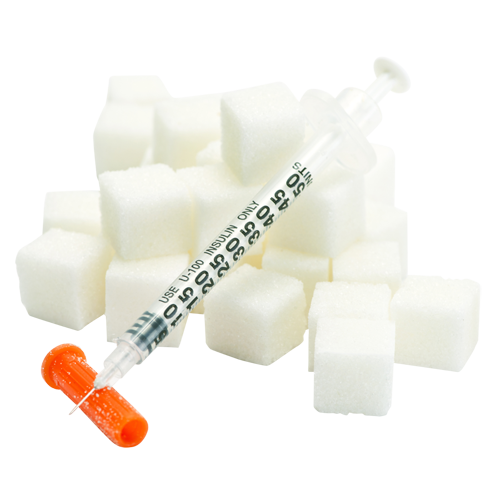Several people with diabetes use insulin to control their diabetes. Here is a simple guide to help you.
What is the role of insulin?
The human body is made up of billions of cells that need fuel to function: glucose (sugar), found in the blood. Blood glucose mainly comes from nutrition, but it is also partially produced by the liver. Insulin is the hormone that enables the body’s cells to use glucose as an energy source. In people with diabetes, insulin is non-existent, insufficient or does not function adequately. Insulin is absolutely necessary to maintain glycemia (blood glucose levels) within a healthy range.
Types of diabetes
There are three main types of diabetes: type 1, type 2 and gestational diabetes.
The pancreas of people with type 1 diabetes does not produce or produces very little insulin. This is why they must self-administer insulin every day by injection or using an insulin pump. For people with type 2 diabetes, the pancreas functions, but it produces an insufficient amount of insulin. Additionally, the body’s cells may not use the insulin properly. Therefore, insulin is sometimes used to complement the action of a diet tailored to your needs, exercise and oral medication. We refer to gestational diabetes when it appears during pregnancy. Optimal gestational diabetes management is key due to the possible risks to the baby’s health as well as the mother’s.
What types of insulin are available on the market?
There are various types and commercial formulations of insulin. The various types of insulin are classified according to their speed and duration of action. Here is a list of the types of insulin:
- very rapid-acting (Apidra®, Humalog®, NovoRapid®, Fiasp etc.)
- rapid-acting (Humulin®R, Novolin® ge Toronto, etc.)
- intermediate-acting (Humulin®N, Novolin® ge NPH, etc.)
- long-acting (Lantus®, Levemir®, Toujeo, Tresiba, etc.)
- pre-mixed (a combination of two types of insulin in one formulation, often a very rapid-acting or rapid-acting insulin mixed with an intermediate-acting insulin; Humalog® Mix 25, Humulin® 30/70, Novolin® ge 30/70, NovoMix 30, etc.).
Generally speaking, the more rapid-acting the insulin, the shorter the duration of action, and vice versa. The advantage of combining several types of insulin is to mimic the normal secretion of insulin by the pancreas over 24 hours, with "spikes" at mealtime and a basal insulin dose the rest of the time.
When to start insulin
If you have type 1 diabetes, insulin treatment begins upon receiving the diagnosis. If you have type 2 diabetes and your blood glucose is not well controlled through diet and medication, your doctor may want to begin the use of insulin. Do not view this as a failure. The time may come when the use of insulin is needed. Insulin is sometimes begun at the time of the diagnosis; when blood glucose is very high.
Although the idea of insulin injections may be unpleasant for many, most people adapt very well to this new reality. In some cases, insulin use will be temporary, in others, it will not.
How is insulin administered?
Insulin is most often administered subcutaneously (under the skin), using various devices:
- Insulin syringes.The insulin is withdrawn from a small vial using a syringe and is injected under the skin.
- Insulin pens.These are small devices that look like a large pen and that contain an insulin cartridge and a disposable needle. It is easy to use and to carry, and simplifies insulin dosing for injection.
- Insulin pump.This is a small device about the size of a pager that contains insulin. Owing to an infusion set, it is attached to the skin by a tube of varying length. The pump is programmed to deliver predetermined amounts of insulin throughout the day. Additional doses can be administered ("bolus") if needed, such as at mealtime.
Close monitoring of blood glucose is key!
If you have to use insulin to control your diabetes, it is essential to closely monitor your blood glucose. Close monitoring will prevent problems related to episodes of hyper and hypoglycemia.
Don’t hesitate to speak to your pharmacist for additional information about the treatment of diabetes and the administration of insulin.


